Fast Facts
- When: 11th August 2023 to 19th May 2024
- Where: Various
- Watch: Sky Sports, BT Sport, Amazon
- Official Website: Premier League
The 2023/24 season will be the 32nd edition of the Premier League. The campaign begins on Saturday 12th August with the 38th and final round of the season taking place on Sunday 19th May, but what twists and turns will there be in between?
Manchester City and manager Pep Guardiola were again unstoppable last season on their march to their fifth league title in six years. They finished 5 point ahead of Arsenal who were top for much of the season, with Manchester United and Newcastle United completing the top four and the Champions League positions.
Liverpool and Brighton finished in fifth and sixth place respectively and qualified for the 2023/24 Europa League whilst Aston Villa, who finished in seventh position will compete in the UEFA Conference League.
Burnley, Sheffield United and Luton Town all joined from the Championship and they’ll look to replicated the promoted teams from last season who all stayed up.
Below we’ll have the lowdown on all the key Premier League offers and promotions when available.
Existing Customer Free Bets & Money Back Offers
Place an in-play single bet of £10 or more on any Premier League or EFL Championship game playing on Saturday 27th April (min odds 1/2) and you can get a free £5 bet to use in-play on a Premier League game playing on Sunday 28th April.
Opt-in and place bets totalling £75+ on football (min odds evens) and for each corner in the Tottenham Hotspur v Arsenal game, you could get a £1 free bet. Qualifying bets must be placed before 14:00 on 28/04/24 and settled before 23:59 on 28/04/24.
Bet £10 or more on a pre-match Bet Builder market of the Premier League game between Tottenham Hotspur v Arsenal and you can get a free £5 bet to place on a another Bet Builder. Minimum combined odds of 4/1 apply, bets must have 3 or more selections to qualify. Match kicks-off at 14:00 on Sunday 28th April.
On the Aston Villa v Chelsea game, place a pre-match bet on the First/Last/Anytime Goalscorer, Correct Score, HT/FT & Scorecast markets and if there is a straight red card awarded within 90 mins, you could be refunded with a free bet up to £10 if your bet loses. This game is playing at 20:00 on Saturday 27th April. Bets must be singles at odds of at least evens (2.0) to apply.
Get your single bets paid out if the team you back goes 2 goals ahead - for multiple bets the selection will be marked as a winner with bet365. Applies to pre-match single and multiple bets on the standard Full Time Result market for applicable competitions. Only available to new and eligible customers.
Place a pre-match acca on selected markets such as the Match Result and Both Teams to score and if it wins, you could get a cash bonus of between 2.5% and 50%. If just one leg of your bet loses, you could get a cash refund of up to £10. Apples to bets with 5+ legs, each with odds of at least 1/2. Bonuses will be:
- 5 Legs - 2.5% Bonus
- 6 Legs - 10% Bonus
- 7 Legs - 15% Bonus
- 8 Legs - 20% Bonus
- 9 Legs - 25% Bonus
- 10 Legs - 30% Bonus
- 11 Legs - 40% Bonus
- 12+ Legs - 50% Bonus
Both existing and new customers could get boosted odds on Premier League markets. Each day there will be a minimum of one boost available per customer which can increase the odds on your bet up to a maximum stake of £50. Click 'Boost' when available from your betting slip to boost your odds.
On Premier League matches and other sports, bet on an accumulator with 10bet and you could get a bonus of up to £5,000 in cash if it wins. The amount of bonus applied will depend on how many legs your acca has. Bets must be trebles or above. Each selection must have odds of 1/2 (1.5) or greater.
| Legs | Bonus |
|---|---|
| 3 | 5% |
| 4 | 10% |
| 5 | 15% |
| 6 or 7 | 20% |
| 8 or 9 | 30% |
| 10 or 11 | 40% |
| 12 | 50% |
| 13 | 60% |
| 14 | 70% |
| 15+ | 100% |
Place an pre-match or in-play acca bet with at least 5 legs on Premier League matches and if just one leg only loses, your stake could be refunded with a free bet up to £20. Minimum odds of 1/5 per leg apply. When this offer applies to your accumulator it can be selected via your bet slip by clicking 'Acca Rewards' followed by 'Acca Insure'. Your Premier League selections can also be combined with other sports where selections meet the requirements.
Betfred's Double Delight and Hat-Trick Heaven offer will apply to single bets on the first goal scorer for pre-match bets, and the next goalscorer for in-play bets on selected Premier League games. If you bet on the first goalscorer and they score twice after that, you can get double your odds. Where applicable, if they score a third you can get treble the odds. In-play bets refer to goals scored after bet placement.
Each matchweek during the 2023/24 Premier League season, login and predict the correct scores of the six selected games and you could win £50,000 if getting all your predictions correct. There are consolations prizes starting at a £1 free bet for two correct scores. This is a free to play competition.
- 2 correct scores - £1 free bet
- 3 correct scores - £5 free bet
- 4 correct scores - £50 free bet
- 5 correct scores - £250 cash
- 6 correct scores - £50,000 cash
Predict scores to win up to £1,000,000! We’re giving you the chance to win up to £1,000,000 by predicting the scores of just six Soccer matches, every week at bet365! With the 6 Scores Challenge, all is not lost if you fall short on one or two results, we’re also offering prizes for three, four and five correct results.
Predict the first goalscorer and the time in minutes of the first goal in the West Ham United v Liverpool game and if you are correct you could win a share of £5,000. Entries must be made before the match kicks-off at 12:30 on the 27th April, one free entry per customer.
On selected Premier League matches, predict the correct score of the three games and if you get all three correct, you could get £100 in cash. If you get two correct you could get a free £5 bet and you could get a free £1 bet for one correct selection. This is free to play, one per customer per week.
For the selected game, answer the four questions and if you get all four answers correct, you can win £100 in cash. Three corrects answers will win a £2 free bet, two correct answers will get a £1 free bet. This is a free to play game, answers must be submitted before the match kicks-off.
Stats Articles
- Longest Pointless Starts in the Premier League
- How Often Are Clubs Promoted Back to the Premier League During Their Parachute Payment Period?
- The Average Number of Free-Kicks in a Football Match
- Which Team Has Scored the Fewest Goals in a Premier League Season?
- Which Premier League Season Had the Fewest Goals?
- Which Premier League Season Had the Most Goals?
- Which Player Has Scored the Most Goals in a Premier League Season?
- Which League has had the Most Ballon d'Or Winners?
- Which English Players Have Won the Ballon d'Or?
- How Often Do Teams Relegated from the Premier League Return After One Season?
- Which Premier League Team Had the Highest Number of Red Cards in a Season?
- What is the Average Number of Penalties in a Football Match?
- How Often Are League Titles Decided By Goal Difference (GD)?
- How Often Are Players Sent Off in Football?
- Clean Sheet Stats: How Often Do Football Matches End to Nil?
- How Often Do Football Matches Have Over/Under 2.5 Goals
- Which Team Has Scored the Most Goals in a Premier League Season?
- Which Teams Have Conceded the Fewest Goals in a Premier League Season
- Do Premier League Teams Play Differently Against Their Rivals?
- How Common are Own Goals in Football?
- What Are the Minimum Points Needed in the Premier League to Stay Up & Avoid Relegation
- The Premier League's Record Longest Unbeaten Runs
- Who Are the Dirtiest Teams in the Premier League?
- The Worst Premier League Teams: Lowest Points Totals & Shortest Stints
- How Many Goals Does It Take To Win The Premier League Golden Boot?
- Does Playing Behind Closed Doors Affect Home Advantage?
- Are More Goals Scored In The First Or Second Half In Football?
- How Often Does the First Goal Scoring Team Win the Match in Football?
- What Is The Average Time of the First Goal In Football?
- How Often is a Football Match Won in Injury Time?
- Premier League Average Booking Points Per Match
- What is the Average Number of Goals Scored Per Game in Football?
- How Often Do Teams Score in Injury Time in the Premier League?
- Which English Domestic Football League Has the Highest Average Goals Per Match?
- Home Advantage in Football: How Often Does the Home Team Win?
- How Often Do Both Teams Score in Football (BTTS)?
- How Often Do Over 0.5 Goals Bets Lose?
- Premier League Winning Points Totals: Average, Highest, Lowest & Biggest Margin
- How Often Do Teams Lose or Draw After Going 2 Goals Up?
- Which Teams Have Won The Double In English Football?
- How Often Does the Favourite Win the Premier League?
Premier League Fixtures: Matchday 35
Saturday 27th April
- 12:30 West Ham United v Liverpool
- 15:00 Fulham v Crystal Palace
- 15:00 Manchester United v Burnley
- 15:00 Newcastle United v Sheffield United
- 15:00 Wolverhampton Wanderers v Luton Town
- 17:30 Everton v Brentford
- 20:00 Aston Villa v Chelsea
Sunday 28th April
- 14:00 Bournemouth v Brighton & Hove Albion
- 14:00 Tottenham Hotspur v Arsenal
- 16:30 Nottingham Forest v Manchester City
Premier League Stats & Trends
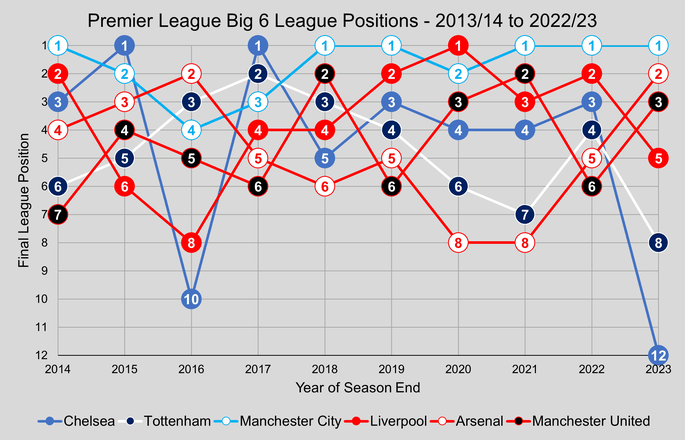
Big 6 Team’s Premier League Record – 2013/14 to 2022/23
| Team | Titles | Top 2 | Top 4 | Top 6 |
|---|---|---|---|---|
| Manchester City | 6 | 8 | 10 | 10 |
| Chelsea | 2 | 2 | 7 | 8 |
| Liverpool | 1 | 4 | 7 | 9 |
| Manchester United | 0 | 2 | 5 | 9 |
| Arsenal | 0 | 2 | 4 | 8 |
| Tottenham Hotspur | 0 | 1 | 5 | 8 |
Premier League Season 2022/23 Top Player Stats
| Most Goals | Most Assists | Most Clean Sheets |
|---|---|---|
| Erling Haaland (36) | Kevin De Bruyne (16) | David de Gea (17) |
| Harry Kane (30) | Mohamed Salah (12) | Alisson (14) |
| Ivan Toney (20) | Leandro Trossard (12) | Nick Pope (14) |
| Mohamed Salah (19) | Michael Olise (11) | Aaron Ramsdale (14) |
| Callum Wilson (18) | Bukayo Saka (11) | David Raya (12) |
| Marcus Rashford (17) | Riyad Mahrez (10) | José Sá (11) |
| Gabriel Martinelli (15) | Trent Alexander-Arnold (9) | Emiliano Martínez (11) |
| Ollie Watkins (15) | James Maddison (9) | Ederson (11) |
| Martin Ødegaard (15) | Bruno Fernandes (8) | Kepa Arrizabalaga (9) |
| Aleksandar Mitrovic (14) | Christian Eriksen (8) | Lukasz Fabianski (8) |
| Bukayo Saka (14) | Morgan Gibbs-White (8) | Bernd Leno (8) |
| Pascal Groß (8) | Jordan Pickford (8) | |
| Erling Haaland (8) | ||
| Bryan Mbeumo (8) | ||
| Ivan Perisic (8) | ||
| Andrew Robertson (8) |
About The Premier League
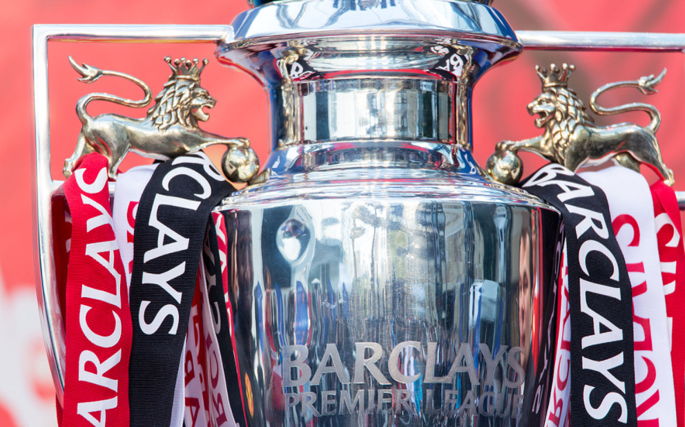
The Premier League is one of the highest-profile leagues in world football, in spite of the fact that it’s only been running in its current format since 1992, though there has been a top-flight championship since 1888. That makes it technically one of the youngest top-flight divisions in the world, yet over the years it has developed into one of the most-watched and highest-anticipated football leagues on the planet.
The Premier league has some of the largest viewing figures of all top-flight leagues and one of the highest revenues in the game. In fact, it’s been reported that the league generates over £2.2 billion a year in domestic and international television rights alone, with £1.6 billion of that filtering down into the teams that take part in the league. Figures took an upwards turn in 2015 however, where broadcasters Sky and BT paid a total of £5.16 billion to renew their contracts up until the 2018-19 season.
In 2019, Amazon joined Sky Sports and BT (TNT) Sports in becoming a domestic broadcaster, with a deal worth £4.35 billion to show 200 games per season. The subsequent cycle between 2022/23 and 2024/25 saw a renewal with Sky Sports, BT Sport and Amazon Prime.
As the most-watched league in the world, the Premier League pulls in some pretty astonishing numbers in term of viewing figures with, around five billion people watching from more than two hundred territories around the globe.
The History of the League

Obviously a league as popular and impressive as the Premier League has more to tell you about than simply the number of people that tune in to watch its games. One of the confusions surrounding the English top-flight involves its foundation; after all, teams count the titles that they won before the formation of the Premier League in their trophy tally, so doesn’t that mean that the old First Division is where life began? The short answer is ‘no’, with the First Division actually being the league that developed into the Championship.
The reason that it’s slightly confusing is that the twenty-two teams that made up the First Division resigned from the Football League as one in order to form the Premier League back on the 27th of May 1992. That meant that the top-flight in English football became an entirely new entity, separated in terms of commercialisation from the Football League. As a result, the Second Division became the new top-flight in the Football League. What’s important here is to remember that relations between the Premier League and the Football League remained cordial enough for teams to be relegated into and promoted from the new First Division.
Why the Split Came About

One of the key words that is consistently used when discussing the Premier League is ‘money’. Men such as David Dein at Arsenal and Martin Edwards at Manchester United spent the end of the 1980s realising that there were huge commercial possibilities for clubs in the English top-flight, especially if they were able to run the clubs more akin to a business than a sports enterprise. The top teams had long considered breaking away from the Football League in order to create a division that would see them accrue more of the money available, which resulted in TV deals and other sponsorship money being redirected towards those sides in order to appease them.
At the start of the 1990s, with football keen to rid itself of the image of being rife with hooliganism and poor facilities, the top teams in the First Division had a meeting with the then managing director of London Weekend Television, Greg Dyke. Dyke was convinced that showing the best teams competing on his channel would increase his viewer numbers, whilst also allowing those teams to earn more money from their appearances on TV. The decision was to breakaway from the Football League and form a new division at the top of English football. The only fear was that the Football Association might not sanction it, meaning that it would lack any credibility.
The Formation of the League
Often in life, timing is just as important as what it is that you’re doing. Such was the case with the Premier League when it decided to move away from the Football League, given that the governing body of the English game and the Football League itself were at loggerheads. As a result, the Football Association had no problem with sanctioning the new top-flight, believing that it would weaken the Football League’s position. The clubs in the top-flight signed a ‘Founder Members Agreement’ in July of 1991, outlining the fact that it would become separate and distinct from the rest of football in the UK in terms of sponsorship agreements and broadcast deals.
Three teams, Luton Town, Notts County and West Ham United, were relegated out of the First Division at the end of the 1991-1992 season, with three teams earning promotion and replacing them in the new Premier League. Despite being part of the conversation around the idea of the formation of a new league, they were not to be a part of it. Instead, the twenty-two teams that made up the new Premier League were as follows:
Premier League Teams – 1992/93 Season
| Team | League Position 1991/92 | Current League (2023/24) |
|---|---|---|
| Arsenal | 4th (Division 1) | Premier League |
| Aston Villa | 7th (Division 1) | Premier League |
| Blackburn Rovers | 6th (Division 2) | Championship |
| Chelsea | 14th (Division 1) | Premier League |
| Coventry City | 19th (Division 1) | Championship |
| Crystal Palace | 10th (Division 1) | Premier League |
| Everton | 12th (Division 1) | Premier League |
| Ipswich Town | 1st (Division 2) | Championship |
| Leeds United | 1st (Division 1) | Championship |
| Liverpool | 6th (Division 1) | Premier League |
| Manchester City | 5th (Division 1) | Premier League |
| Manchester United | 2nd (Division 1) | Premier League |
| Middlesbrough | 2nd (Division 2) | Championship |
| Norwich City | 18th (Division 1) | Championship |
| Nottingham Forest | 8th (Division 1) | Premier League |
| Oldham Athletic | 17th (Division 1) | National League |
| Queens Park Rangers | 11th (Division 1) | Championship |
| Sheffield United | 9th (Division 1) | Premier League |
| Sheffield Wednesday | 3rd (Division 1) | Championship |
| Southampton | 16th (Division 1) | Championship |
| Tottenham Hotspur | 15th (Division 1) | Premier League |
| Wimbledon | 13th (Division 1) | League 2 |
Whether the Football League liked it or not, there was a new top-flight in town and everything was set up for it to become a behemoth. Players who had previously been going to compete in La Liga in Spain and Italy’s Serie A because of the better facilities were soon heading to England in the promise of riches beyond anything they’d seen before. The English game had cleaned up its image and, as mentioned before, the influx of money was about to change everything.
Reduction in the Number of Teams
In the early 1990s the International Federation of Association Football, or FIFA, decided that it wanted all domestic leagues in the world to reduce the amount of games it asked its competitors to play, with the hope being that this would increase the quality of FIFA’s international tournaments like the World Cup. The Premier League chose to oblige, relegating four teams at the end of the 1994-1995 season and seeing just two sides promoted in their stead. The result was that the top-flight returned to having the twenty teams that it had boasted prior to the expansion to twenty-two that had occurred in 1991.
For more than a decade the Premier League, as with the likes of the Spanish and Italian top-flights, played out their season with twenty teams taking part. Then, in 2006, FIFA decided that it wanted domestic leagues to reduce their size even further ahead of the following season. This time, however, the Premier League refused. La Liga and Serie A joined the Premier League in refusing to change the number of teams taking part in their campaigns and FIFA decided not to fight them on the matter. As a result, the 2007-2008 season went ahead with the same twenty team field that had been in place since the mid 1990s.
Format
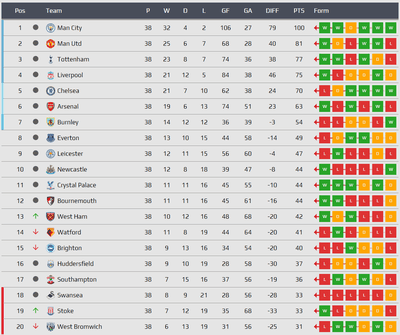
The league is made up of twenty teams in total and gets underway in the first couple of weeks of August. It then runs through until its conclusion in early May, with each team playing each other twice: once home and once away. The teams are awarded three points for a victory and one point for a draw, with a loss resulting in zero points for that team.
At the campaign’s conclusion, sides are ranked in a league format based on the number of points they have managed to accumulate during the course of the season. If, at the end of the season, two or more teams are tied on the same number of points then it will go down to goal difference and then the number of goals scored. If all of these are exactly the same then a one-off game will decide where each team will finish.
At the end of the season the team with the most points will be crowned the champions and be awarded an automatic Champions League spot for the following season. The next three spots, second, third and fourth, will also get an automatic Champions League spot. Fifth position will get an automatic spot in the UEFA Europa League, whilst sixth will enter it at the qualifying stage. There’s also a Europa League spot up for grabs for the team that wins the FA Cup, with the place being handed to the next highest league finisher that doesn’t qualify for Europe if the FA Cup winner has already earned the right through their league performance.
The winners of the EFL Cup will gain entry in the the UEFA Conference League however if the winners have already qualified for the Champions League or Europa League the Conference League positions goes to the next highest league position outside of the other UEFA competitions.
The bottom three teams are all relegated into the Championship and three teams will replace them as they get promoted from the second-tier in time for the following campaign to get underway. Such is the difference in finances between the top-flight and the second-tier, the Premier League offers the relegated teams parachute payments, which is an amount of money paid over three years. The aim of this is to stop sides from getting themselves in to massive financial trouble, which has happened with the likes of Leeds United in the past.
The Finances
Though parachute payments make sense in some ways, there are those that object to them. For starters, the relegated teams find themselves in a much better position financial than any of the teams in the league below, meaning that the chance of them bouncing back up to the Premier League is greater than that of a club that has never been promoted. As a result, the Football League and the top-flight have been working together to find ways of making the payment to the relegated clubs more sensible, with the hope being that they’ll find a way to cushion the blow of relegation without giving the teams that have dropped down an unfair advantage.
In terms of how much teams are paid for their Premier League finish, the following chart should give you an example as it’s from the 2018-2019 season:
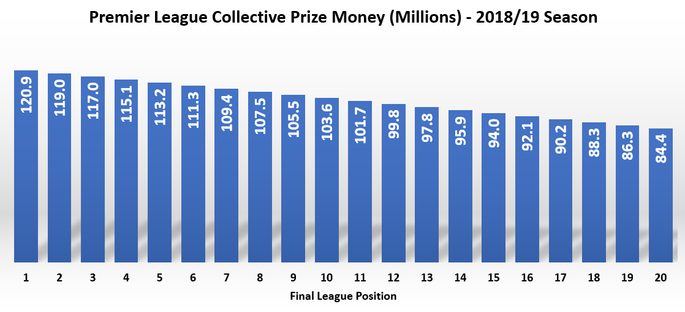
It should be noted, of course, that the above doesn’t tell the full story. Premier League teams also earn a considerable amount of money for television appearances, with additional payments of around £1.2 million for each game shown live on television domestically. The number of times each team was shown live during the 2018/19 season is shown below.
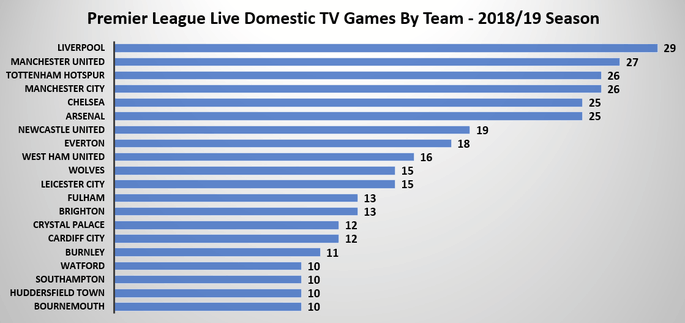
This is to say nothing of any commercial deals that they’re able to negotiate for themselves. Again, they have an unfair advantage of Championship sides on account of the fact that they’re on television much more regularly and are watched by billions around the globe, making it easier to convince companies to pay them large sums of money to sponsor their shirts and so on.
The Trophy
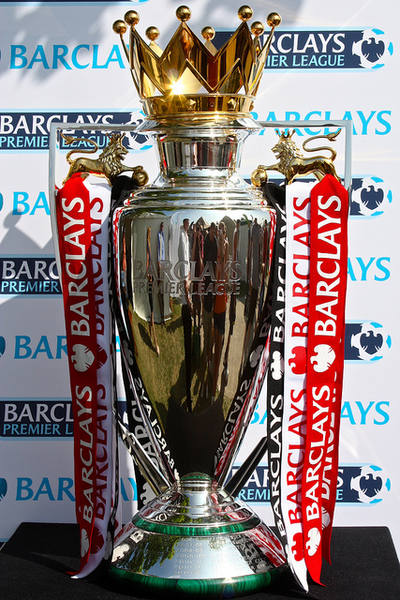
As well as earning a huge chunk of money and getting to play in the Community Shield ahead of the following season, the Premier League champions also lift the Premier League trophy.
Created by the jewellers Asprey of London, the Premier League trophy stands at thirty inches tall and boasts a width of seventeen inches and a depth of around ten. That includes both the trophy and its base, of course, with the combined plinth and trophy weighing in at around twenty-five kilograms.
Winning teams not only find their ribbons put on the trophy on the day that they lift it but also get to keep their own copy of it to put in their trophy room. It’s made from a mixture of sterling silver and silver gilt, with a rare material called malachite used for the trophy’s plinth. There’s a lion on either side of the trophy as part of the three lions of English football, with the third lion being made up by the winning team’s captain when he lifts it into the air.
In 2004, after Arsenal won the Premier League without losing a game, they were presented with a gold version of the trophy in honour of their ‘Invincibles’ season.
Interesting Facts

Throughout the history of the Premier League (since 1992/93) there have been fifty teams that have competed at some point in time, but only seven different teams have ever won the league. These are Manchester United, Chelsea, Arsenal, Manchester City, Liverpool, Blackburn Rovers and Leicester City.
Manchester United are the most decorated team in the history of the Premier League, having won the title on no fewer than thirteen separate occasions. Arsenal, who have won the league on three occasions themselves, pulled off one of the most remarkable league wins in the 2003-04 season where they went unbeaten throughout the campaign. They earned the nickname of ‘The Invincibles’ because of their amazing feat of twenty-six victories, twelve draws and no defeats.
Alan Shearer is the player with the most goals in Premier League history, having found the back of the net on 250 occasions in 441 appearances during an illustrious career. Shearer averaged 0.59 goals per game, a number only beaten by that of Arsenal’s Thierry Henry with a ratio of 0.68 goals per game from his one hundred and seventy-five Premier League goals.
As you might imagine, of course, the Premier League has many more interesting bits of trivia associated to it than just that, with the following being examples of things you might want to know:
- As well as being the league’s most successful team, Manchester United have also won the trophy more times consecutively than any other side. They managed three back-to-back trophies between both 1998 to 2001 and 2006 to 2009
- Manchester City boast the biggest winning margin, finishing 19 points clear of Manchester United at the end of the 2017-2018 season
- That year City also managed to win more games than any side in previous Premier League history, taking three points 32 times and accruing one hundred points, Liverpool matched this in 2019/20, with 99 points in total
- In 2004-2005 Chelsea made history when they allowed opposition sides to score just 15 times against them in 38 games
- Manchester City’s record-breaking 2017-2018 campaign saw them score 106 goals, which is the most of any side since the league started
- Arsenal, Chelsea, Everton, Liverpool, Manchester United and Tottenham Hotspur are the only teams never to be relegated out of the Premier League
- 83,222 people turned up to Wembley Stadium to watch Tottenham play Arsenal in 2018, setting a Premier League attendance record
- A mere 3,039 people watched Crystal Palace play Everton in 1993, the Premier League’s lowest attendance to date
